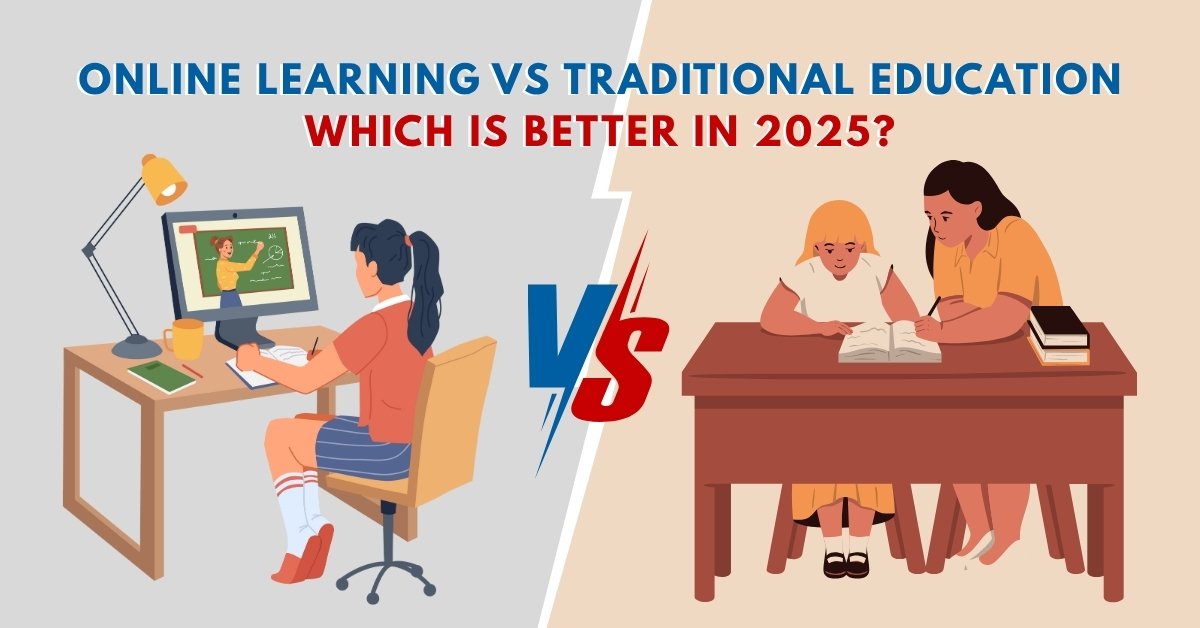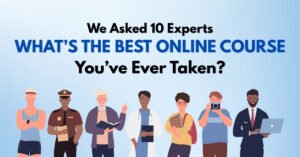In a world where digital transformation is reshaping nearly every industry, education stands at a pivotal crossroads. With the rapid advancement of online learning platforms, many students, professionals, and parents are asking:
Is online learning better than traditional education in 2025?
This blog post on Learners View dives deep into this evolving debate, comparing both education models across accessibility, cost, flexibility, outcomes, and more — helping you make an informed choice.
Table of Contents
- Introduction: The Changing Face of Education in 2025
- Defining the Two Models
- Key Differences: Online Learning vs Traditional Education
- Pros and Cons of Online Learning in 2025
- Pros and Cons of Traditional Education in 2025
- Cost Comparison: Online vs Traditional
- Flexibility and Accessibility
- Effectiveness & Learning Outcomes
- Technological Advancements in Online Education (2025 Trends)
- When Online Learning is the Better Option
- When Traditional Education Still Matters
- Future Predictions: Hybrid Learning & Beyond
- FAQs
- Conclusion: Which One Should You Choose in 2025?
Introduction: The Changing Face of Education in 2025 {#introduction}
The year 2025 marks a major milestone in education. The global eLearning market is projected to surpass $500 billion, fueled by the demand for flexible, remote-friendly, and tech-integrated education solutions.
At the same time, traditional institutions are also evolving, integrating more blended learning techniques. But can these changes help traditional models compete with the convenience and customization of online education?
Let’s compare both head-to-head.

Defining the Two Models {#defining-the-two-models}
Online Learning
Also known as eLearning or remote learning, online education refers to courses delivered via internet-based platforms. Learners access content through videos, quizzes, interactive modules, and live or recorded lectures.
Popular platforms in 2025 include:
- Coursera
- Udemy
- edX
- LinkedIn Learning
- Skillshare
Traditional Education
This refers to in-person, classroom-based learning offered through schools, colleges, and universities. It typically involves face-to-face interactions, fixed schedules, physical presence, and a structured academic calendar.
Key Differences: Online Learning vs Traditional Education {#key-differences}
| Criteria | Online Learning | Traditional Education |
|---|---|---|
| Location | Anywhere with internet | On-campus/in-person |
| Flexibility | High (self-paced) | Low to Moderate |
| Cost | Generally lower | Higher (tuition, commuting, housing) |
| Interaction | Virtual, sometimes limited | Face-to-face, socially immersive |
| Tech Integration | High (AI, VR, LMS) | Increasing, but slower |
| Credentials | Certifications, micro-degrees | Degrees, diplomas |
Pros and Cons of Online Learning in 2025 {#pros-and-cons-of-online-learning}
✅ Pros
- Learn at your own pace
- Study from anywhere
- Cost-effective
- Massive course variety
- Industry-relevant certifications
- Adaptive technologies (AI, AR/VR)
❌ Cons
- Requires self-discipline
- Less social interaction
- Limited hands-on/practical experience
- Perceived credibility issues in some industries
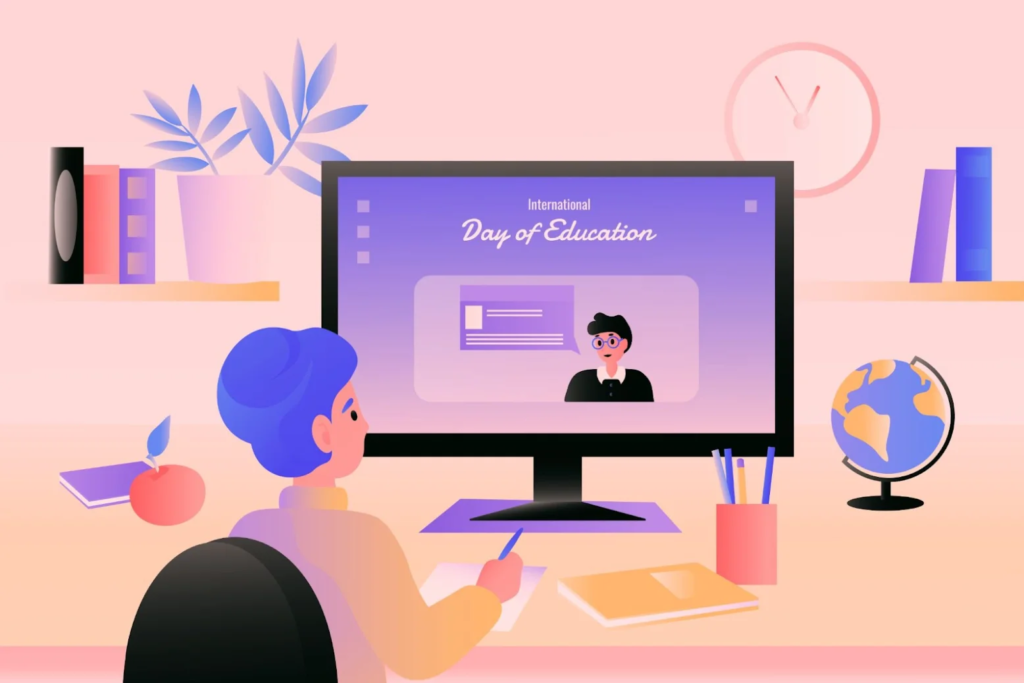
Pros and Cons of Traditional Education in 2025 {#pros-and-cons-of-traditional-education}
✅ Pros
- Structured learning environment
- Rich peer and faculty interaction
- Recognized degrees
- Campus experience (labs, sports, clubs)
- Networking opportunities
❌ Cons
- Higher costs (tuition, books, accommodation)
- Fixed schedules reduce flexibility
- Commuting or relocation needed
- Often slower to adopt new tech
Cost Comparison: Online vs Traditional {#cost-comparison}
Online Learning
- Free to ~$500 for most short courses
- Platform subscriptions ($20–$60/month)
- No travel or accommodation expenses
Traditional Education
- $10,000–$40,000 per year (college)
- Books, accommodation, transportation
- Financial aid often required
Online learning wins in terms of affordability and ROI — especially for career-switchers and professionals.

Flexibility and Accessibility {#flexibility-and-accessibility}
Online learning has become a lifeline for:
- Parents balancing work and education
- Rural students with limited access to institutions
- Working professionals reskilling for new careers
Meanwhile, traditional institutions are attempting to adapt via hybrid models and asynchronous lectures — but accessibility remains a challenge for many.
Effectiveness & Learning Outcomes {#learning-outcomes}
Studies in recent years show blended learning (combining online + offline) often yields the best outcomes.
However, online learning can match — and sometimes exceed — traditional methods in:
- Skill-based education
- Technical certifications
- Test prep and upskilling
Traditional methods may still dominate in:
- Medical fields
- Lab sciences
- Performing arts
Online learning is more outcome-driven when structured properly with good content, feedback, and community.
Technological Advancements in Online Education (2025 Trends) {#tech-trends}
Key innovations enhancing online learning:
- AI tutors and chatbots
- AR/VR simulations for hands-on learning
- Gamified learning modules
- Blockchain for certification authentication
- Personalized learning paths via data analytics
These advancements have made online education more immersive and effective than ever.
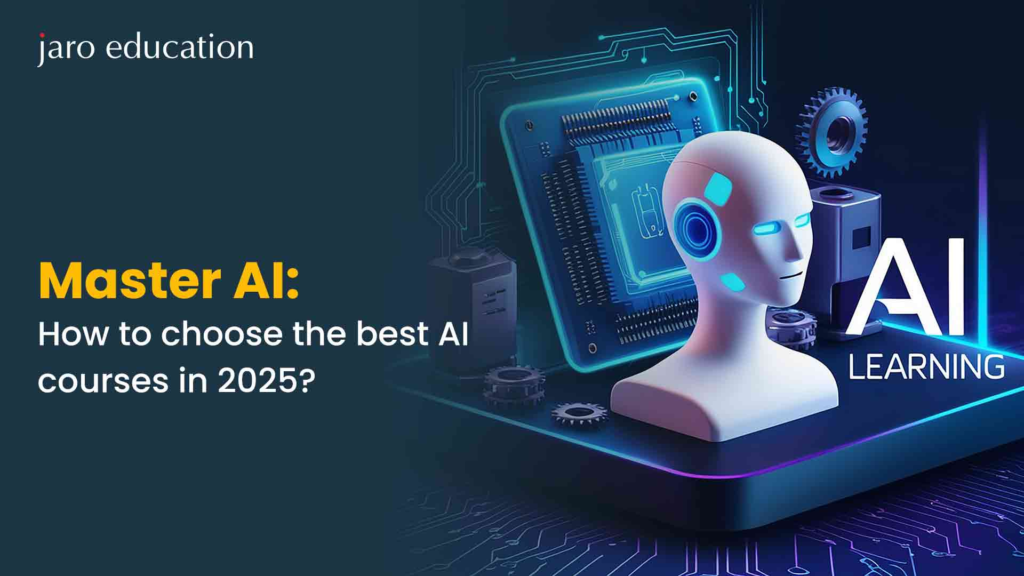
When Online Learning is the Better Option {#when-online-wins}
Choose online learning if you:
- Want to learn tech, business, or design skills
- Need to study while working
- Prefer learning at your own pace
- Are preparing for certifications
- Live in a remote or rural area
- Want cost-effective education options
When Traditional Education Still Matters {#when-traditional-wins}
Stick with traditional learning if:
- You’re pursuing a regulated profession (medicine, law)
- You value campus life and peer interaction
- You need access to physical labs or studios
- You prefer instructor-led, structured environments

Future Predictions: Hybrid Learning & Beyond {#future-predictions}
The future is not a choice between online or traditional — it’s hybrid.
Expect to see:
- Universities offering fully online degrees
- More bootcamp-university partnerships
- Micro-credentials becoming mainstream
- AI guiding learning pathways
- Students building custom degree paths from multiple platforms
FAQs {#faqs}
Coursera
edX
Udemy
Pluralsight
Skillshare
LinkedIn Learning
Unlikely. They will adapt with hybrid models, offering more flexible and tech-integrated learning experiences.
Conclusion: Which One Should You Choose in 2025? {#conclusion}
There is no one-size-fits-all answer in 2025. The best learning model depends on your goals, resources, and learning style.
Choose online learning if you want flexibility, affordability, and career-focused skills.
Stick with traditional education if you’re pursuing a professional degree or value in-person learning environments.
Or better yet — combine both worlds through hybrid learning paths. That’s the true future of education.
Author Profile
- Jiya Gupta
- At Learners View, we're passionate about helping learners make informed decisions. Our team dives deep into online course platforms and individual courses to bring you honest, detailed reviews. Whether you're a beginner or a lifelong learner, our insights aim to guide you toward the best educational resources available online.
Latest entries
 Course PlatformsOctober 3, 2025We Asked 10 Experts: What’s the Best Online Course You’ve Ever Taken?
Course PlatformsOctober 3, 2025We Asked 10 Experts: What’s the Best Online Course You’ve Ever Taken? Career GrowthOctober 2, 2025MIT OpenCourseWare Review: Can Free Courses Compete with Paid Ones?
Career GrowthOctober 2, 2025MIT OpenCourseWare Review: Can Free Courses Compete with Paid Ones?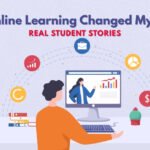 Course PlatformsOctober 1, 2025How Online Learning Changed My Career – Real Student Stories
Course PlatformsOctober 1, 2025How Online Learning Changed My Career – Real Student Stories Course PlatformsSeptember 16, 2025Best Graphic Design Courses for Freelancers
Course PlatformsSeptember 16, 2025Best Graphic Design Courses for Freelancers

